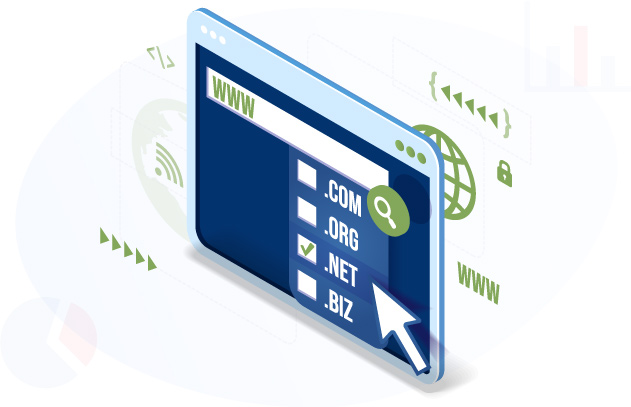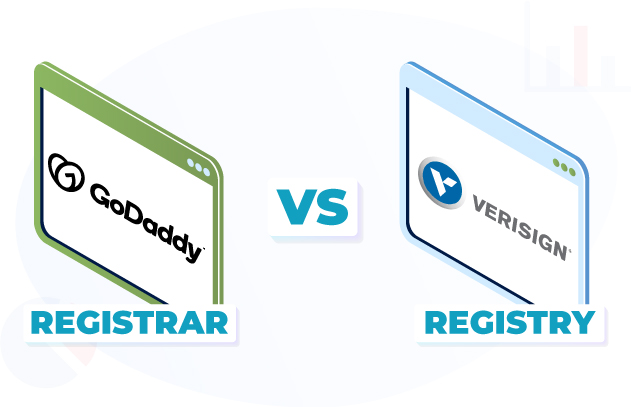Each year, over 1.6 million new domain names are registered online. If you want to maintain a unique online identity, you need a registered domain name.
Having assisted numerous clients in securing registered domain names, I have amassed considerable expertise in this area.
In this guide, I will do my best to explain to you all the essential aspects you should know about domain name registrars and why you need one for your domain registration.
Table Of Contents
- What Is A Domain Name Registrar?
- What Is The Difference Between A Registrar And A Registry?
- How Does A Domain Registrar Work?
- What Is Private Domain Name Registration?
- What Is A Domain Name Server?
- How Do Domain Name Registrars Protect User Privacy?
- What Role Do Registrars Play In DNS Security?
- How Do I Find My Current Domain Name Registrar?
- How Do I Register A New Domain Name?
- How Does Domain Name Transfer Work
- What To Look For In A Domain Registrar?
- What Is A Top-level Domain?
- Why Having a Registered Domain Name Matters?
What Is A Domain Name Registrar?
A domain name registrar is an organization or company accredited by the Internet Corporation for Assigned Names and Numbers (ICANN) or a national country code top-level domain (ccTLD) authority. Their primary function is to manage the reservation and registration of domain names on the internet.
When you build a website, you have to assign it a domain name. All websites on the internet have unique IP addresses and domain names.
For example, Wikipedia’s domain name is Wikipedia.com. Its IP address is 208.80.154.232.
You can use either to visit the site, by entering the IP address into your browser’s address bar, but clearly, using the name is much easier.
If you want to make it easier for your clients/audience to find your website, you need to buy and register a unique domain name.
This job is handled by domain name registrars or DNS registrars for short. You can buy your preferred domain name from a registrar. They will then register the domain name, linking it to your website’s IP address.
You can think of them as car dealers – they sell you the product and handle the paperwork. But a dealership does not make the cars – that supply comes from elsewhere. And in the domain business, that role is fulfilled by domain registries.
What Is The Difference Between A Registrar And A Registry?
The difference between a registrar and a registry lies in their distinctive responsibilities. We can use the car dealership analogy to understand the relationship between domain registrars and registries.
A registrar acts as a middleman between the customer and the actual supplier of the product, in some ways like a car dealer.
In the case of domain names, a registry is like a car manufacturer. It maintains and manages the actual database containing all domain names. In the DNS hierarchy, a domain registry sits above domain registrars.
There are multiple domain registries out there, each managing a particular top-level domain (TLD). In a website address, the top-level domain is the small sequence of letters at the end – like .com, org, and .edu.
For example, the databases for all websites using the .com and .net TLDs are handled by a company called Verisign. The databases for .org sites are handled by a non-profit organization called Public Interest Registry.
These registries outsource the customer-side business to domain registrars. When you buy a domain name from a DNS registrar, the registrar has to notify the concerned registry and also pay them their share of the fees.
This system allows registries to focus on core activities like general administration, setting rules, security and stability, and settling disputes between entities about ownership of specific domain names.
All registries and registrars operate under the central authority of the Internet Corporation for Assigned Names and Numbers, or ICANN.
Formed in 1998, ICANN is a not-for-profit organization involving IT and communications industry bodies, government representatives, and other global organizations.
ICANN coordinates everything related to the domain name/IP address system of the internet through a department called the Internet Assigned Numbers Authority (IANA).
How Does A Domain Registrar Work?
The domain registrar works like a pyramid structure with ICANN at the top. Under its authority, individual organizations like Verisign manage registry services for specific top-level domains like .com, .net, .uk, .ru, etc.
To become a domain name registrar, a company has to deal with both ICANN and the registry organization. Only ICANN-accredited businesses are allowed to sell domain names to consumers.
Interested business organizations have to prove that they have the required financial and technical capabilities to operate a domain registrar business.
If the ICANN is satisfied with the credentials, it will provide accreditation to the registrar and also inform all registry operators. After getting accreditation, the domain registrar has to sign agreements with the registry operators.
For instance, if a company wants to sell .com domains, it has to enter into a contract with Verisign. If it is a Canadian company interested in selling .ca domains, it has to sign a contract with the Canadian Internet Registration Authority (CIRA).
Once a domain registrar acquires both an ICANN accreditation and a domain registry contract agreement, it can start selling domain names to customers.
Many modern domain registrars also offer other value-added services like domain hosting and domain transfers.
Here is the basic process of buying a .com domain:
You approach a domain registrar and provide the relevant information
The registrar will charge you fees (including a service charge and registration fees)
The registrar files the domain registration information to Verisign, the .com registry operator
The registrar also pays the relevant registration fees to Verisign
You get a fully registered .com domain for your website
What Is Private Domain Name Registration?
When you buy a domain name from a registrar, you have to provide certain contact details including your name, address, email, and phone number. This information is linked to your domain name.
The registrar is contractually obliged to share this information with ICANN. The information is held across registries across the world in a database system called WHOIS.
Anybody can check this contact information online using the WHOIS search function.
The WHOIS database exists for perfectly legitimate reasons – to verify a site’s legitimacy or contact a domain owner for buying the domain name, etc.
Unfortunately, in this era of growing cybercrime, personal contact details can be easily misused for spamming, phishing, etc. This is why many domain registrars offer the option of private domain name registration.
Instead of posting your contact information to the ICANN WHOIS database, the registrar will provide alternate contact details. Usually, the contact information provided is that of the registrar or a proxy service owner by the registrar.
Domain registrars usually charge extra fees for private domain name registration. Using this feature makes sense if you are an individual concerned about privacy.
For businesses, which usually have public contact details anyway, private registration is only beneficial in certain specific situations where it makes sense to hide ownership of specific domains.
The main problem with private domain registration is ownership – in most instances, ownership is based on the information available in ICANN databases.
If your domain name is registered with contact details from a proxy, it basically means that the registrar owns the domain.
While this is not problematic in most situations, it is still a factor worth considering. You don’t have to worry about registrars stealing your domain name – they rely on repeat business and would not want to alienate customers in any way.
What Is A Domain Name Server?
A Domain Name Server (DNS) is a fundamental component of the internet infrastructure that translates human-readable domain names into IP addresses used by computers and other devices to identify and communicate with one another.
Computers don’t need domain names to locate websites. They can do that using the unique IP address assigned to a website or server located on a network.
When you register a domain name for your website, it is linked to the IP address of your website. The information connecting your domain name to the correct IP address is stored on a domain name server.
When any user enters the domain name in a browser, the system will send a query to the domain name server. It provides the computer with the right IP address allowing the system to display the correct website to the user.
Domain name servers are a vital cog in internet machinery. It acts as a connecting link between domain names (used by humans) and IP addresses (used by computers).
How Do Domain Name Registrars Protect User Privacy?
Domain name registrars protect user privacy with private domain name system registration as the main process.
With private registration, the registrar will act as a proxy for the user and keep user data away from WHOIS databases.
Based on this, the domain name registrar will still main client records on their databases.
If someone gains unauthorized access to the registrar databases, they can find useful data. Registrars may also share user data with governments or law enforcement agencies.
What Role Do Registrars Play In DNS Security?
Domain name registrars play a significant role in DNS security by offering various services and features that help protect domain names and the associated DNS infrastructure.
A major concern in DNS security is domain hijacking. Also called domain theft, it involves changing the registration details of a domain name without the permission of the original owner.
Criminals can do it in several ways:
By impersonating the original owner: This is usually done after acquiring personal credentials through theft, phishing, or social engineering. The criminal can then approach the domain registrar and convince them to change the registration information or even move the domain to another registrar.
By exploiting security vulnerabilities at the registrar: This is a more direct attack on the business providing domain registration services. Criminals can gain unauthorized access to the system using stolen passwords and make direct unlawful changes to domain ownership
ICANN guidelines mention several steps that registrars can take to prevent domain hijacking and improve DNS security. These include:
Stronger AuthInfo Code Management – use more secure codes for the domain transfer process
Use more robust domain lock settings to make it harder for unauthorized individuals to transfer domains
Use more strict ID verification processes for user interactions after registration
Use better record-keeping systems to prevent the easy transfer of domain names
How Do I Find My Current Domain Name Registrar?
You can find your current domain name registrar in two ways.
If you are the owner of the domain name, you can usually find the registrar information in your email inbox – search for any invoices related to your domain name.
Another way is by using any publicly available WHOIS search tool. Many online sites provide this service for free. Do a Google search for WHOIS to find one in your region. In the search tool, enter your domain name – the search results will usually have registrar information.
How Do I Register A New Domain Name?
You can register a new domain fairly easily. Pick a highly rated domain registrar that offers domain names using your preferred TLD (.com, .org, etc.). Check the official lists to ensure that the registrar is accredited with ICANN.
Most registrars give you easy methods to search for available domain names using a domain name search tool. Pick an available name that fits your purpose, and proceed with the purchase process.
You will have to provide your name and contact details. After that, pay the stated fees to get your newly registered domain name! For a
How Does Domain Name Transfer Work
Domain registration does not come with any long-term contractual obligations. You don’t have to stick with your original domain registrar forever.
ICANN security policy to prevent domain hijacking only says that you have to stick with a domain registrar for 60 days.
After that waiting period, you can transfer your domain name to a different service provider, using the following basic steps:
Unlock your domain name at your current registrar
Disable all privacy protection measures at the domain name registrar
Obtain a domain authorization code from your registrar
Contact your new registrar and follow the steps provided
What To Look For In A Domain Registrar?
We reviewed top 10 largest domain registrars in 2023 and these are the features you should keep an eye out for:
Pricing: Owning a domain name is a recurring expense. Compare one-year prices of different companies to find the cheapest service. Don’t base your decision purely on pricing – also look at other factors.
Reputation: Look at online reviews to see if the company has reliable customer service. Also, ensure that the company has the appropriate credentials like ICANN and registry operator accreditation.
Add-ons: Most domain registrars provide value add-on services like private domain registration, auto-renewals, and domain-specific email addresses. Many also provide bundled web hosting services.
What Is A Top-level Domain?
A top-level domain is the portion of a domain name that comes after the period, such as.com or.net. The Internet Corporation for Assigned Names and Numbers (ICANN) used to be somewhat stringent about allowing new TLDs. Initially, the majority of specialty TLDs were associated with a particular industry, website type, or geographic region. For example .com was reserved for commercial enterprises.gov for government websites, and.org for non-profit organizations.
As the Internet has expanded, however, the demand for more accessible domain names has prompted ICANN to remove constraints on the number of TLDs and who may use them.
As a result, when you do a domain name search on the website of your preferred registrar, you will find a variety of TLD alternatives at various pricing ranges. If the desired domain name is not available as a.com, you may be able to purchase it for less at a.us or.site TLD.
Why Having a Registered Domain Name Matters?
Whether you are an individual blogger or business owner, having your own unique domain name can be highly beneficial.
It can boost your brand value, increase your online visibility and bring more targeted traffic to your website. It’s also important l to pick a trusted provider for domain registration.
We hope you found our guide on domain registrars helpful.
For more information about web, hosting basics check out our guide What Is Web Hosting? Everything You Need To Know where you can find out about the different types of web hosting services as well as the key features you should look for and how to choose a good provider.


















